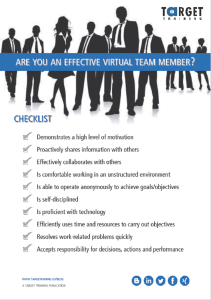When trainers become participants: 17 tips for getting the most from your training
As a training company we invest in internal training with a passion. We can cover many of the soft skill and leadership topics internally, but when we are lacking the insider knowledge we carefully qualify and source external providers. One of the questions we ask a potential provider is their experience in training trainers. Training trainers can be daunting as you know that your participants are evaluating the training and you as the trainer with a insider’s eye (much like a chef cooking for another chef who is watching them work in their own kitchen!). When trainers become participants, they also go through an internal process which can be every bit as uncomfortable. We recently organized a seminar for a small group of our management team. Bringing in an external trainer changed the dynamics, and as experienced trainers we were now in the passenger seat. Over the 2 days we asked ourselves “what could we as participants do to get the very most from our training?”. Here are our tips for getting the very most from your training experience.
Engage with the training and trainer before you start
- Make sure you know why the training has been organized. What is the context for the training? And what does your organization / your manager hope you’ll take from the training? Ideally your manager will have shared this with you, but if not then seek it out. And if for some reason you can’t get an answer before the training stats then get it during or after the training! If you want to make the most of your training investment, understanding the what’s and why before the training starts is a must [Making most of your TI ebook]
- Build clear goals. What would you like to leave with? What questions do you have? What would you like to learn? practice? reflect on? And discuss these with your colleagues too!
- Is there anything you as the participants can do before the training to help the trainer/training really go to plan? Is there any information that you’d like to share? Or want them to be aware of?
Choose your attitude
- Suspend judgement. You, your manager or your organization has qualified and selected this training (and maybe this particular trainer) so trust that they know what they are doing and let them do it.
- Connected to this, the trainer and training is already paid, so adopt a “what can I take from this?” mentality and not a “prove yourself to me” Be curious and be open to learn what you expect and what you may not expect too!
- Share your thoughts and feedback with the trainer before it is too late. Don’t wait until the end to tell the trainer you would like them to have done something differently. Don’t adopt a “I don’t want to rock the boat” or “why bother approach”. It could be that the trainer or training can’t give you what you want – but wouldn’t you rather want to know sooner than later rather than sitting there thinking “when will we ..?”
- Reinforce the positive – feedback forms have a place, but like anyone trainers like to hear positive feedback as they work. If you find something useful, interesting or enjoyable then openly share this.
Help yourself during the training so you can help yourself later
- Organize and write your notes from the outset in a way that will help you make sense of them when you refer back afterwards.
- Find and use tools that will help you during the training. If something interests you proactively ask for suggestions for books, websites etc so you can go deeper later
- Be honest and open about your problems. Don’t hesitate to ask you trainer to repeat something, explain something again or share more examples. If you are struggling there’s a good chance one of your colleagues is too!
- Look to bring in examples from your day to day life during the training. This helps to make the training more relevant and transferable. It will also help the other participants and the trainer to connect learning to reality.
- Ask all your questions. I mean, why wouldn’t you?
- Use your breaks to reset and recharge. Don’t try and work for 10 minutes, but instead stretch, get some fresh air, talk to the others. Network, reflect or recharge.
See the training as the start of something
- Review your notes at the end of each day and in a few weeks, to help with transfer and long-term memory. Consider setting up a calendar reminder a month later to revisit the training
- Take one concrete action immediately after the training.
- Catch up with your colleagues back at the office. Maybe you want t0 schedule lunch with a colleague who was also in the training and review both content and actions since the training.
- Commit to one or two transfer steps you will do after the training. Make these concrete and share them with others.
So whether you have an internal or external trainer, you also have a big role to play in getting the very most from your training day. Let us know if you have any other tips too!












